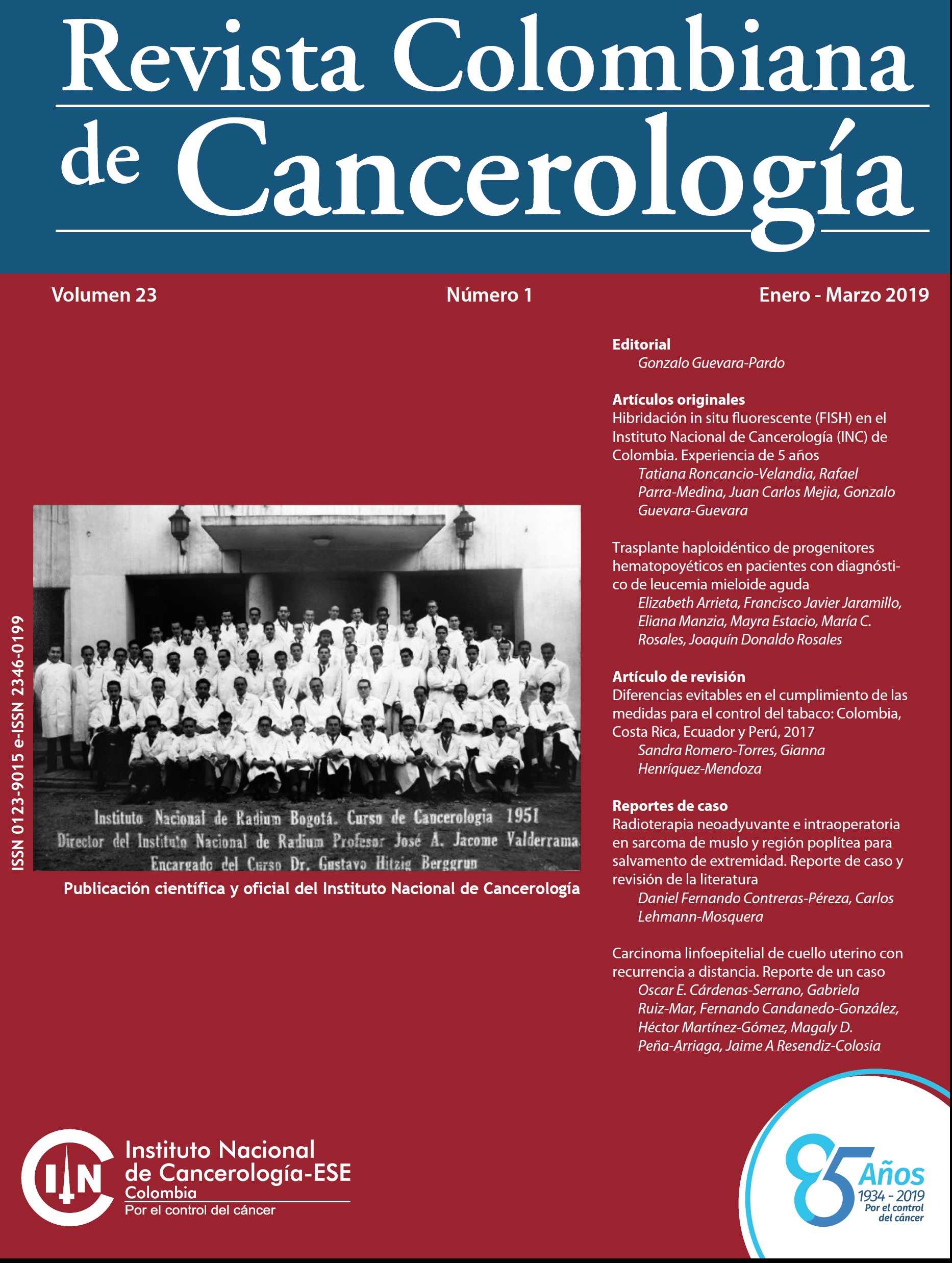Trasplante haploidéntico de progenitores hematopoyéticos en pacientes con diagnóstico de leucemia mieloide aguda
DOI:
https://doi.org/10.35509/01239015.74Palabras clave:
Trasplante de células madre hematopoyéticas, Donante haploidéntico, Leucemia mieloide aguda, Acondicionamiento mieloablativoResumen
Introducción: En pacientes con leucemia mieloide aguda (LMA) el trasplante de progenitores hematopoyético (TPH) es el único tratamientoz curativo. El objetivo de este estudio es presentar la experiencia y resultados del trasplante haploidéntico en pacientes adultos con LMA en la Fundación Valle del Lili, Cali – Colombia.
Materiales y métodos: Estudio de cohorte retrospectivo de pacientes que recibieron trasplante haploidéntico entre 2013 y 2017, con acondicionamiento mieloablativo y ciclofosfamida postrasplante, en Fundación Valle del Lili, Cali (Colombia).
Resultados: Se realizaron 47 trasplantes en pacientes con leucemia mieloide aguda en la fecha de estudio, se incluyeron en el análisis 21 pacientes con donante haploidéntico, a 3 años tanto la supervivencia global y libre de eventos fue del 38%. La incidencia acumulada de mortalidad relacionada al trasplante fue del 26% a 100 días y del 38,3%, a 38 meses de seguimiento. La incidencia acumulada de recaída a 38 meses fue del 19%. Con respecto a la enfermedad injerto versus huésped (EICH) se encontró que la incidencia acumulada de EICH aguda grado II-IV, grado III-IV y EICH crónico fue del 19%, 5% y 19% respectivamente.
Conclusión: Los resultados de este estudio sugieren que el trasplante haploidéntico es una alternativa factible como tratamiento para pacientes con diagnóstico de LMA en nuestro medio.
Referencias bibliográficas
Reisner Y, Hagin D, Martelli MF. Haploidentical hematopoietic transplantation: current status and future perspectives. Blood. 2011;118(23):6006-17.
Parmesar K, Raj K. Haploidentical Stem Cell Transplantation in Adult Haematological Malignancies. Adv Hematol.2016;2016:1-16.
Di Stasi A, Milton DR, Poon LM, Hamdi A, Rondon G, Chen J, et al. Similar Transplantation Outcomes for Acute Myeloid Leukemia and Myelodysplastic Syndrome Patients with Haploidentical versus 10/10 Human Leukocyte Antigen-Matched Unrelated and Related Donors. Biol Blood Marrow. Transplant. 2014;20(12):1975-81.
Al-Homsi AS, Roy TS, Cole K, Feng Y, Duffner U. Post-Transplant High-Dose Cyclophosphamide for the Prevention of Graft-versus-Host Disease. Biol Blood Marrow Transplant. 2015;21(4):604-11.
Godley LA, van Besien K. The Next Frontier for Stem Cell Transplantation. JAMA. 2010;303(14):1421-2. 6. Przepiorka D, Weisdorf D, Martin P, Klingemann HG, Beatty
P, Hows J, et al. 1994 Consensus Conference on Acute GVHD Grading. Bone Marrow Transplantation. 1995;15(6):825-8.
Lee CJ, Savani BN, Mohty M, Labopin M, Ruggeri A, Schmid C, et al. Haploidentical hematopoietic cell transplantation for adult acute myeloid leukemia: a position statement from the Acute Leukemia Working Party of the European Society for Blood and Marrow Transplantation. Haematologica. 2017;102(11):1810-22.
INS I nacional de salud. INFORME ANUAL RED DE DONACIÓN Y TRASPLANTES COLOMBIA. Edición En Línea AUTORES GRUPO RED DE DONACIÓN Y TRASPLANTES; 2015. Disponible en: https://www.ins.gov.co/Direcciones/RedesSaludPublica/DonacionOrganosYTejidos/Estadisticas/Informe Red de
Donación y Trasplante 2015.pdf. Accessed October 25, 2018.
Salvatore D, Labopin M, Ruggeri A, Battipaglia G, Ghavamzadeh A, Ciceri F, et al. Outcomes of hematopoietic
stem cell transplantation from unmanipulated haploidentical versus matched sibling donor in patients with acute myeloid leukemia in first complete remission with intermediate or high-risk cytogenetics: a study from the Acute Leukemia Working Party of the European Society for Blood and Marrow Transplantation. Haematologica. 2018;103(8):1317-28.
Yahng SA, Kim JH, Jeon YW, Yoon JH, Shin SH, Lee SE, et al. A Well-Tolerated Regimen of 800 cGy TBI-Fludarabine-Busulfan-ATG for Reliable Engraftment after Unmanipulated Haploidentical Peripheral Blood Stem Cell Transplantation in Adult Patients with Acute Myeloid Leukemia. Biol Blood Marrow Transplant. 2015;21(1):119-29.
Ciurea SO, Champlin RE. Donor Selection in T Cell–Replete Haploidentical Hematopoietic Stem Cell Transplantation: Knowns, Unknowns, and Controversies. Biol Blood Marrow Transplant. 2013;19(2):180-4.
Brissot E, Labopin M, Ehninger G, Stelljes M, Brecht A, Ganser A, et al. Haploidentical versus unrelated allogeneic stem cell transplantation for relapsed/refractory acute myeloid leukemia: A report of 1578 patients from the Acute Leukemia Working Party of EBMT. Haematologica. October 2018:haematol.2017.187450.
Gratwohl A, Brand R, Frassoni F, Rocha V, Niederwieser D, Reusser P, et al. Cause of death after allogeneic haematopoietic stem cell transplantation (HSCT) in early leukaemias: an EBMT analysis of lethal infectious complications and changes over calendar time. Bone Marrow Transplant. 2005;36(9):757-69.
Forcina A, Rancoita PMV, Marasco V, Greco R, Lupo-Stanghellini MT, Carrabba M, et al. Infection-Related
Mortality (IRM) after Allogeneic Hematopoietic Stem Cell Transplantation: Age, CMV Status, Pre-Transplant IgA and IgM Levels Predict IRM and Survival in a New Clinico-Biological Scoring System Developed in 492 Consecutive Patients. Blood. 2016;128(22):2220.
Sestili S, Labopin M, Ruggeri A, Velardi A, Ciceri F, Maertens J, et al. T-cell-depleted haploidentical stem cell transplantation results improve with time in adults with acute leukemia: A study from the Acute Leukemia Working Party of the European Society of Blood and Marrow Transplantation (EBMT). Cancer. 2018;124(10):2142-50.
Rashidi A, DiPersio JF, Westervelt P, Vij R, Schroeder MA, Cashen AF, et al. Comparison of Outcomes after Peripheral Blood Haploidentical versus Matched Unrelated Donor Allogeneic Hematopoietic Cell Transplantation in Patients with Acute Myeloid Leukemia: A Retrospective Single-Center Review. Biol Blood Marrow Transplant. 2016;22(9):1696-1701.
Spitzer TR. Haploidentical stem cell transplantation: the always present but overlooked donor. Hematol Am Soc Hematol Educ Progr. 2005:390-5.
Kanakry CG, Fuchs EJ, Luznik L. Modern approaches to HLAhaploidentical blood or marrow transplantation. Nat Rev Clin Oncol. 2015;13(1):10-24.
Cómo citar
Descargas

Publicado
Número
Sección
Licencia
Todos los derechos reservados.




